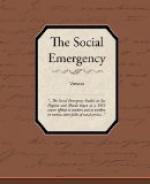Local or operative treatment is not as a rule necessary, for the majority of cases yield to a strict regime of hygienic living. The regime should include regulation of sleeping, of eating, of hours of work and relaxation, of dressing and of exercise. The exercise should be prescribed and directed by a person trained in medical gymnastics.
Frequently mental disturbances are associated with the phenomenon of menstruation. The most usual symptoms are heightened irritability, hysterical manifestations and depression. Depression is often the only symptom; to some girls the premonitory “blues” signify the approach of the period. Occasionally we encounter the reverse, an excessive stimulation and feeling of well-being and strength. There is some loss in the power of concentration. In normal cases, however, this loss is less than many people suppose it to be. Lassitude and a feeling of general debility are confined chiefly to the anaemic cases.
The mental symptoms clear up as the physical condition is improved, aided by a sensible attitude toward the whole process. Often girls who suffer some pain live through the whole month in dread of the period. This attitude should be changed, by lessening the pain and by psychic therapy. Psychic therapy has proved successful in obstinate cases.
The girl who suffers considerably from any of these disorders at the monthly period should be relieved from the strain of examinations, the classroom, and lessons which must be learned, although mental hygiene requires that her mind be kept active and her interests in quiet pleasures stimulated. She should not be left to introspection and morbidness or to the sickly sentimental thoughts often recommended for her. This alone would cause her to exhibit some of the so-called “phenomena” of adolescence. Many of these phenomena are abnormal and are traceable to low physical vitality and lack of strong mental interests. The menstrual period should not be attended by pain or discomfort; nor should our girls be brought up to regard it as a time of sickness. When our girls are taught that normal girls experience no indisposition at this time, they will not be resigned to pain. The high-school life of the girl below the average in physical vitality cannot be regulated to her advantage in a co-educational school. Cities should maintain girls’ high schools, taught by women teachers, for all girls upon whom the stress and strain of competition with normal individuals would react unfavorably. In the majority of cases, menstrual pain in girls is due to nerve tension, anaemia and poor circulation, improper clothing, and mental attitude. The girls who experience no pain are those who have led an active out-of-door life and have never stopped playing.




